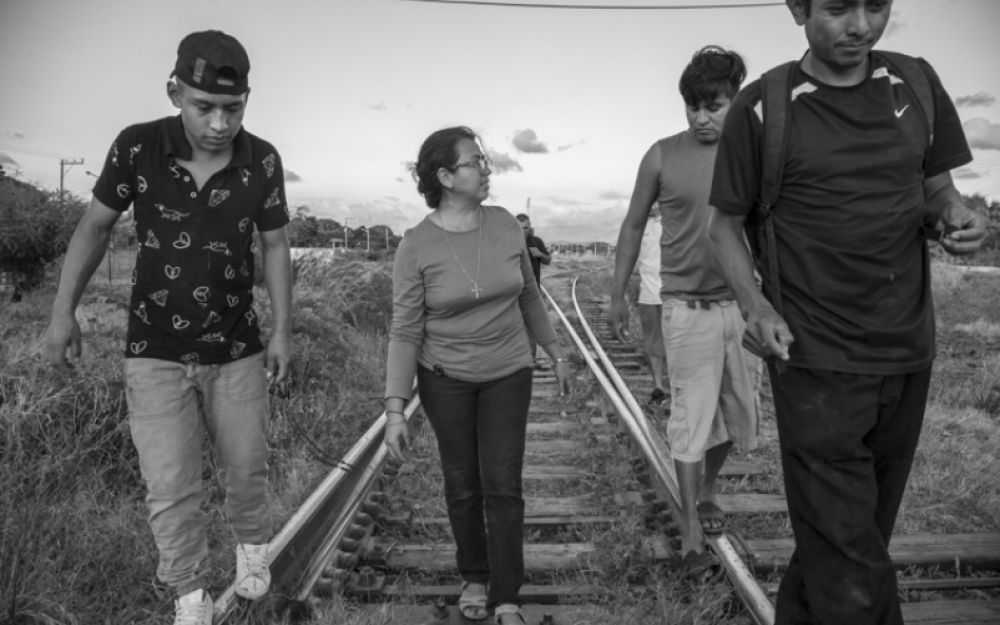
Guardian Angel Sr. Eligia Ayala Molina, center, walks with migrants around the neighboring train tracks. (Lisa Kristine)
Alone or with a partner, consider the following:
- What is the longest distance you've ever walked or traveled?
- How you feel when your journey was over? Were you exhausted or rejuvenated?
- How did you recover for whatever came next? Did anyone help you recuperate?
Migrants fleeing their homelands in Central America to seek refuge in the United States face a dangerous and grueling journey through Mexico. They often have endured awful physical or psychological trauma. Sisters working in a shelter for refugees welcome them with love and make great sacrifices to provide care. Observe the challenges the migrants face, as well as the ways the sisters discover the strength to serve them.
Guardian Angel sisters in Mexico risk safety to aid often-traumatized migrants
by Soli Salgado
Guardian Angel Sr. Lorena Hernández Jiménez still remembers one of her first cases as the refugee office coordinator at the shelter on the Mexico-Guatemala border.
Two siblings, ages 26 and 34, passed through the refugee shelter that five Guardian Angel sisters oversee in Ixtepec, Mexico. The young women were escaping extortion from gangs in El Salvador. Hernández was helping them process their request for asylum, which included seeing the photos they'd taken after gang members beat them up.
It began with extortion: A local gang demanded the sisters pay them $50 a week. When the younger sister said she didn't have enough to pay, the men took her upstairs.
"They completely destroyed her, getting her naked and hitting her 15 times with a baseball bat on the back," Hernández said.
Later, the same happened to her sister. When the gang found out the sisters had reported them to the police, they began threatening their children.
But at the shelter, they had a strong case for asylum, with photos of their injuries as evidence and the ongoing threats to their family.
For many migrants heading north from Central America, particularly those seeking asylum, the sisters' shelter on the border is a crucial pit stop.
At the Albergue Hermanos en el Camino (Shelter for Brothers on the Road), migrants who are eligible to apply for asylum can stay for months; others stay a few nights, using the shelter's resources to tend to injuries, use the computer lab, make calls, get a haircut and new clothes, and have a few meals.
But to the Guardian Angel Sisters, the shelter is more than a center for resources or a bed for the night. It's an opportunity to prevent trafficking and identify those who may have experienced it on their route, as migrants are particularly vulnerable to exploitation.
"This space, above all, is a pathway for [trafficking] victims, but largely for its prevention," said Sr. Carmela Gibaja Izquierdo, coordinator of Red Ramá, the anti-trafficking network for sisters in Central America. Though Gibaja is based in El Salvador, she works closely with and regularly visits the albergue.
"Here is where we help orient their journey, showing them what to look out for, where to go next, how to take care of themselves," Gibaja said of their anti-trafficking efforts. "Some have already been victimized [by trafficking] in some way, so we help them recover from the experience." They notify the government if the individual has experienced trafficking, while also offering the shelter's psychological services.
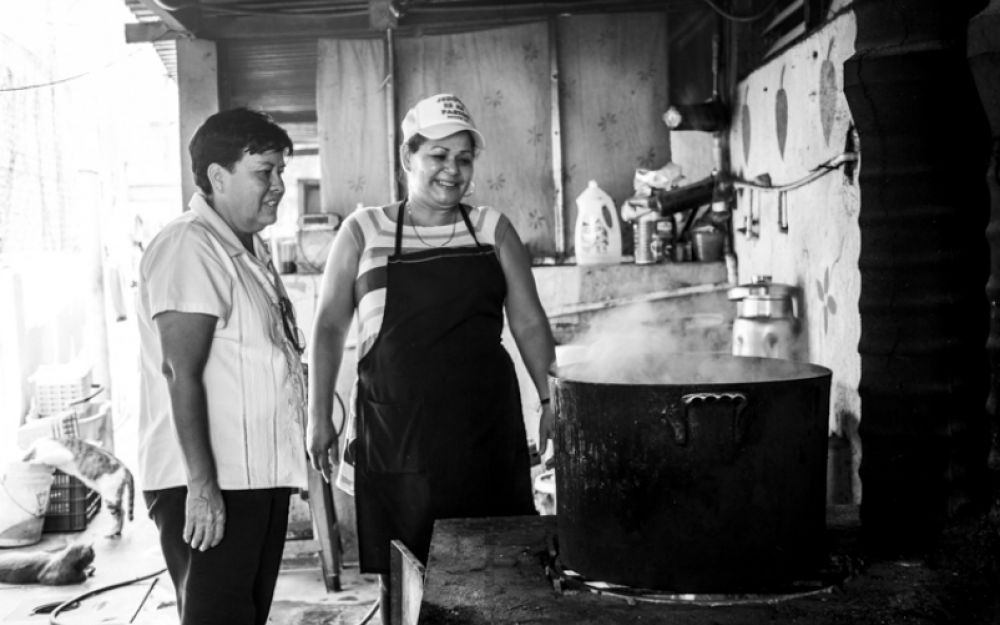
Guardian Angel Sr. Lorena Hernández Jiménez visits with a volunteer in the kitchen at the Albergue Hermanos en el Camino in Ixtepec, Mexico. Updating the kitchen is a priority for the shelter, she said, since it often gets too hot for those who have to work over the pot. (Lisa Kristine)
Largely from Honduras, El Salvador or Guatemala, those who live at the center awaiting refugee status share a common backstory: escaping gang violence. Sometimes the threat is targeted intimidation or the recruitment of their children into the gangs.
One woman living at the albergue with her family told Global Sisters Report that gangs in El Salvador had threatened her husband, a policeman, who refused to give them his guns. Threats directed at their children ensued, and with their toddlers in tow, the couple fled. Their daughter arrived malnourished, while the woman needed psychological services for the trauma from the journey.
"To work with this population, this has to be your vocation because it is incredibly difficult to work with people who come with traumatic backgrounds," Hernández said.
'People want them to disappear'
The state of Oaxaca, where the shelter is located, has one of the highest rates of illiteracy and extreme poverty, and the city of Ixtepec — with a population of about 24,000 — has become a favorite hub for organized crime, the sisters said, with migrants being easy targets.
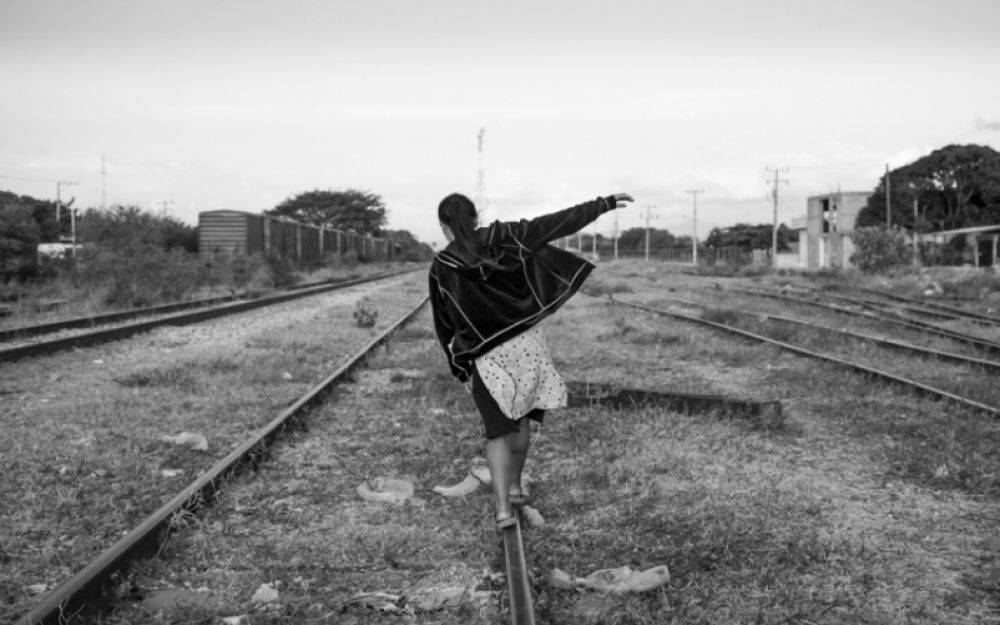
Before 2014, the freight train — commonly known as the Beast — was a popular form of transportation for migrants to reach the Albergue Hermanos en el Camino in Ixtepec, Mexico. (Lisa Kristine)
Fr. Alejandro Solalinde, who founded the shelter, first started tending to the incoming migrants by visiting "The Beast": the freight train migrants regularly rode into town. Here, Solalinde would feed and chat with the migrants as they arrived. Eventually, he found a nearby plot of land where he would oversee the construction of the shelter with the sisters' support.
More than 400 migrants slept in the albergue the first night it opened in February 2007, and, according to its website, it consistently hosts 20,000 a year. Today, with 160 beds, the shelter can accommodate up to 600 a night, covering the patio with mattresses when large caravans arrive. Those applying for refugee status have their own quarters, as their living arrangements are long-term. Their children attend a local school throughout their stay.
The freight train stopped being the chosen form of transportation in 2014, following Mexico's Southern Border Program that prevented migrants from safely traveling on the train without being turned in. Up until then, sisters would go to the tracks as late as 2 a.m. to receive new arrivals, checking them into the shelter and offering them food and medical attention.
Now, migrants may have to walk 75 miles to reach the albergue, exposing themselves to greater risks on the road, including physical or sexual assault, extortion, and kidnapping by gangs as well as by public authorities.
"These shelters need to be protected because people want them to disappear," said Guardian Angel Sr. Concepción Marroquín Nolasco, one of the first sisters to help at the shelter when it opened. "Some shelters have been set on fire, but that's actually more dangerous for the community, because then the migrants are left with nowhere to go and can be recruited into gangs or selling drugs, or they become trafficked."
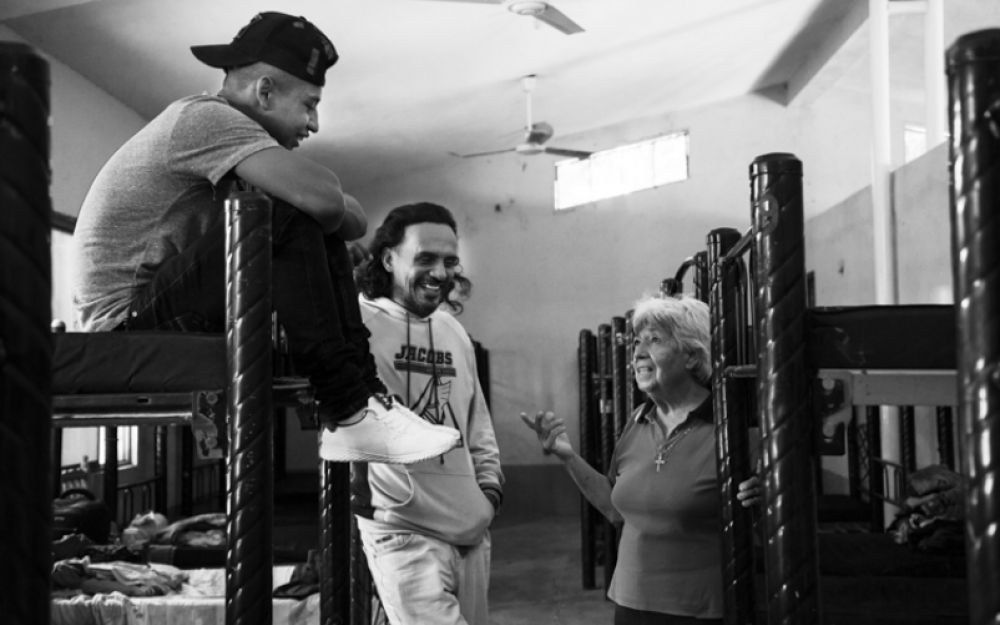
Sr. María Elena Cordero Duarte visits with male migrants in their bunk room at the Albergue Hermanos en el Camino in Ixtepec, Mexico. The men and women have separate quarters. (Lisa Kristine)
According to a July survey conducted by The Washington Post and Mexico's Reforma newspaper, six in 10 Mexicans say migrants are a burden on their country, and almost as many respondents support deporting migrants who travel through Mexico to reach the United States. Just 7 percent believe Mexico should offer residency to Central American immigrants heading to the U.S.
"With this specific shelter, neighbors don't like us because they think of the migrants as criminals, so there's a lot of fear surrounding the shelter," Marroquín said. "And sadly, yes, sometimes they commit crimes.... But it just takes one person for all the migrants to be labeled as criminals."
The slow course of seeking asylum
The Guardian Angel sisters who run the albergue belong to Red Rahamim, Mexico's anti-trafficking network for sisters, which equips sisters with information around training and relevant local news. Red Rahamim is a member of Talitha Kum, the international network for sisters against trafficking.
When migrants arrive, they go through two interviews with volunteers before Hernández, as coordinator of the refugee office, helps them fill out paperwork. She then accompanies them to the government's National Migration Institute, about 40 miles away.
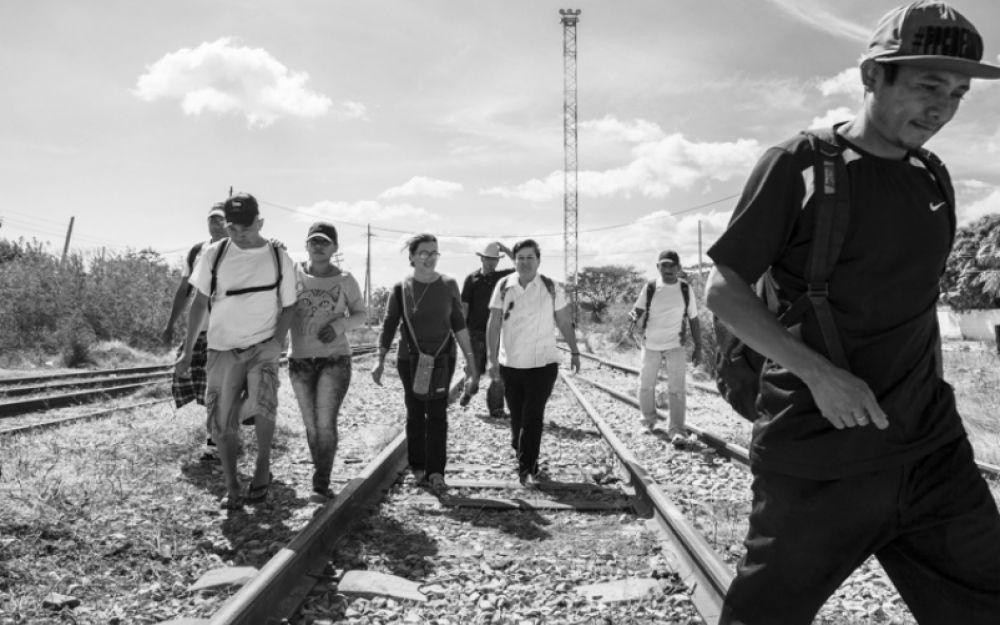
Guardian Angel Srs. Eligia Ayala Molina and Lorena Hernández Jiménez, center, walk with migrants around the neighboring train tracks. (Lisa Kristine)
"With these first steps taken, they can feel safe knowing that, going through the process, they cannot be apprehended," she said.
The National Migration Institute serves as an intermediary between the albergue and the Mexican Commission for Refugee Assistance (COMAR), which officially carries out the process but does not have nearby offices for Hernández to work with directly. For that reason, it's a slow course of action: Each request can take up to four months to fulfill.
At the time of the interview, Hernández said just one in 10 are granted asylum. Those whose results come back negative then turn to a defender's office, where of team of lawyers take on their case, often looking for more supporting evidence from the country they fled.
'It can be dangerous within the shelter'
The two young women who were extorted and beaten in El Salvador were not able to stay in the albergue for long. When they recognized a couple of men at the shelter as gang members from their hometown, Solalinde accompanied the women to Mexico City, where they would await their refugee status.
Unfortunately, that is not a rare occurrence at the albergue.
Even in the interviewing process, sisters and volunteers can't always identify gang members who are infiltrating the shelter to either track their targets or recruit the youths. Now, sisters require a security detail within the shelter at night for their protection, as well.
"As soon as we discover that individuals or youths are ineligible for asylum and have received the treatment they need, we encourage them to leave because it can be dangerous within the shelter," Hernández said. "We talk and try to raise awareness, among the children especially."
Gibaja, who was active in organizing the shelter from the start, said it was imperative the sisters have a communal living space separate from the shelter.
"That was clear for us. Sometimes you feel saturated with work, and you have to take great care of that," she said. "But on the other hand, you have to keep your distance. Self-care is very important; you can feel burned out in this type of work with how painful it is."
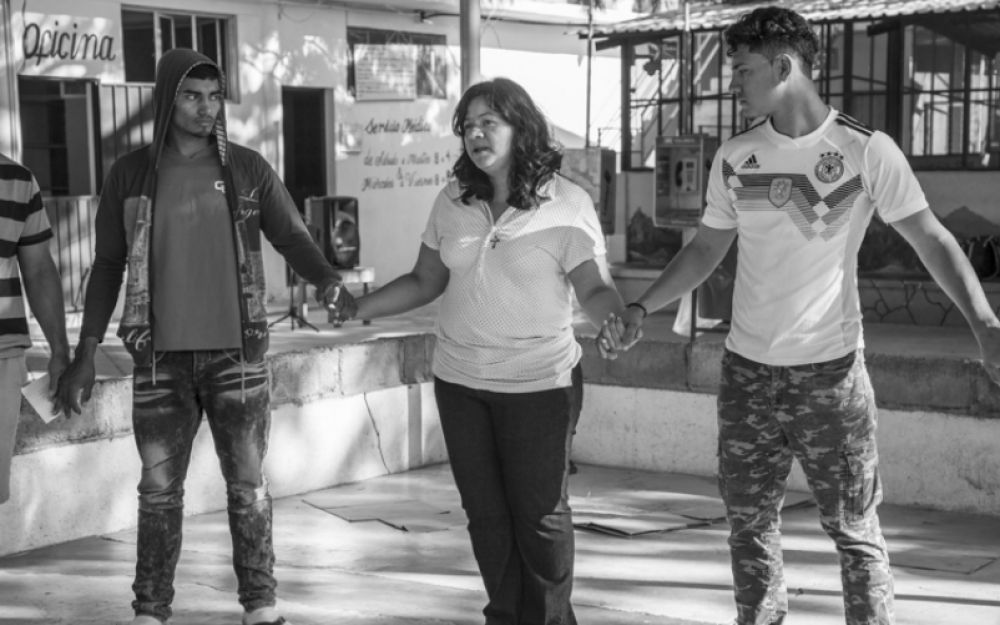
Guardian Angel Sr. Concepción Marroquín Nolasco leads a group prayer before lunch on the patio of the Albergue Hermanos en el Camino in Ixtepec, Mexico. (Lisa Kristine)
Marroquín said although their lives can "truly be in danger, that's our mission."
"We are Guardian Angel sisters, so we are here to protect, accompany and care for. We will share our space, and we will live out our mission."
A welcome with love
The colorful buildings that make up the campus of the albergue are intentional: Often, these sites resemble prisons, but the sisters said they wanted theirs to be as welcoming as possible.
On one Monday, a line formed around the outside patio gathering space for local barbers who visit weekly to offer haircuts. On a nearby table, police were going through the backpacks of those arriving — one of the first steps before they go through interviews and evaluations. Others sat along the buildings, hanging out or playing checkers with bottle caps.
"When someone arrives sun-beaten, tired, depressed, how you receive them is fundamental," said Guardian Angel Sr. Eligia Ayala Molina.
Hernández echoed the sentiment: "If they arrive and we do not welcome them with love, if we do not give them the support they need, we will do more damage on top of what they bring with them from the road."
But when sending them off, Ayala said, they can't be specific in their advice. "We'll tell them about the kinds of things they'll run into on the journey, as well as their rights, but we can't give them an exact course because they keep changing in terms of safety, conditions, viability ... and we also can't know who to fully trust with the information we're giving."
For Ayala, this work is personal. When she was growing up in El Salvador, her family was "incredibly poor," she said, so her father often left them for years at a time to work odd jobs in the United States as an undocumented immigrant, returning when he made enough money.
"Nobody gives you talks on how to do this work," she said. "God gives you what is necessary."
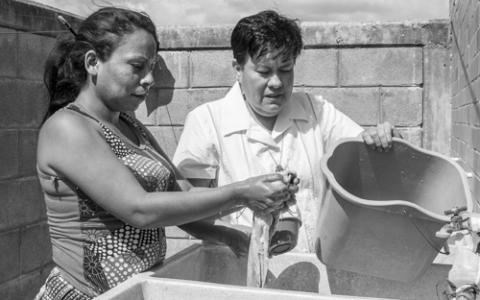
Migrants at the Albergue Hermanos en el Camino in Ixtepec, Mexico, receive new clothes and have access to laundry. Here, Guardian Angel Sr. Lorena Hernández Jiménez helps one wash her clothes. (Lisa Kristine)
Ayala said working at the albergue is like "discovering God through their lives."
"I can't change their circumstances, but I hope I leave an imprint, just as they leave me with imprints of faith and courage and love of family and gratitude."
"Because my dad was a migrant, this is like an opportunity to give back, passing on everything I was able to receive because of what my dad did for us."
Witnessing the faith of the people has been a source of inspiration for Marroquín, as she recalled a family who left the albergue with a bottle of holy water, hopeful that, despite their previous hardships, everything was going to work out for them.
"The Holy Spirit is a force for me," she said. "It is my energy, and it burns from those who offer their time and volunteer their services. ... When we join hands as humans, we can let the Spirit of God flow and open doors."
Serving exhausted and endangered migrants causes the sisters to become weary and threatened themselves.
- What personal challenges do sisters face as they accompany migrants and help them with their burdens?
- What practices and values keep the sisters grounded and effective in their ministry?
- Where do the sisters discover spiritual strength for their work?
In this passage, Jesus calls us to practice hospitality by welcoming, advocating for and loving those who are different and unknown to us.
"For I was hungry and you gave me food, I was thirsty and you gave me drink, a stranger and you welcomed me,
naked and you clothed me, ill and you cared for me, in prison and you visited me."
Then the righteous will answer him and say, "Lord, when did we see you hungry and feed you, or thirsty and give you drink?
When did we see you a stranger and welcome you, or naked and clothe you?
When did we see you ill or in prison, and visit you?"
And the king will say to them in reply, "Amen, I say to you, whatever you did for one of these least brothers of mine, you did for me."
- Jesus not only identifies himself with the stranger but challenges his followers to love and welcome the stranger in their midst. Give two examples of how the Guardian Angel sisters practice hospitality with migrants.
- Sr. Carmela Gibaja Izquierdo recognizes the hardships that she and her sisters face in their ministry to traumatized migrants fleeing gang violence. How do prayer and living in community empower the sisters to respond to the needs of migrants? How can their examples of service, compassion and love bring transformation to gang members who are infiltrating the shelter?
- How have the sisters' encounters with or awareness of migrants shaped your views on immigration? Where are there opportunities for you to practice hospitality?
Violent conflicts and all-out wars continue to tear humanity apart; injustices and discrimination follow one upon the other; economic and social imbalances on a local or global scale prove difficult to overcome. And above all it is the poorest of the poor and the most disadvantaged who pay the price. In this scenario, migrants, refugees, displaced persons and victims of trafficking have become emblems of exclusion. …The presence of migrants and refugees – and of vulnerable people in general – is an invitation to recover some of those essential dimensions of our Christian existence and our humanity that risk being overlooked in a prosperous society. …[O]ur response to the challenges posed by contemporary migration can be summed up in four verbs: welcome, protect, promote and integrate. If we put those four verbs into practice, we will help build the city of God.
Pope Francis' Message for the 105th World Day of Migrants and Refugees 2019
- Pope Francis asserts that our response to the challenges posed by migration can be summed up in four verbs: welcome, protect, promote and integrate. How do the Guardian Angel Sisters in Mexico embrace these verbs in their ministry with migrants? How does their ministry inspire hope for migrants as well as the universal Church?
- Sr. Lorena Hernández Jiménez states, "When we join hands as humans, we can let the Spirit of God flow and open doors." How might the Spirit of God be flowing in you—moving you to welcome and stand in solidarity with migrants?
Sisters are serving migrants on the southern and northern borders of Mexico and all around the world. Discover the work of Sr. Monica and Sr. Maria Jose, who felt called from their lives – one as an archaeologist and the other as an athlete – to spread the Gospel and serve the poor. Learn more about their congregation, the Servants of the Plan of God, and its ministry to migrants south of the U.S. border through this video.
Families and children from Central America are fleeing human rights abuses, gang violence and climate displacement and are seeking refuge in the United States. Learn about their plight by asking your teacher to invite a sister who works on the border, who advocates for immigrants or who serves as an immigration attorney to speak about the border crisis and the root causes of migration and displacement.
- Many migrants who are held in detention facilities experience feelings of isolation and rarely have human contact. Your class or family can be a compassionate presence by becoming a pen pal with detained immigrants through First Friends. A kind letter can remind detainees that they are not alone or forgotten.
Jesus, you call us to welcome the stranger.
May we learn from the example of those who serve our migrant sisters and brothers.
May we recognize you in the face of the stranger.
May we recognize you in the refugee family, seeking safety from violence.
May we recognize you in our sisters and brothers in the desert.
May we recognize you in the weathered face of the migrant, seeking hospitality.
May we recognize you in the fearful face of the mother, protecting her children from would-be traffickers.
May we recognize you in the unaccompanied child, traveling dangerous lands.
May we recognize you in the parents, forcibly separated from their children.
May we recognize you in the migrant, bringing food to our tables.
May we recognize you in the gang members who are also in need of love and compassion.
Transform us to be your messengers of love in a conflicted world and to build community through hospitality and compassion.
Amen.
Tell us what you think about this resource, or give us ideas for other resources you'd like to see, by contacting us at education@globalsistersreport.org
